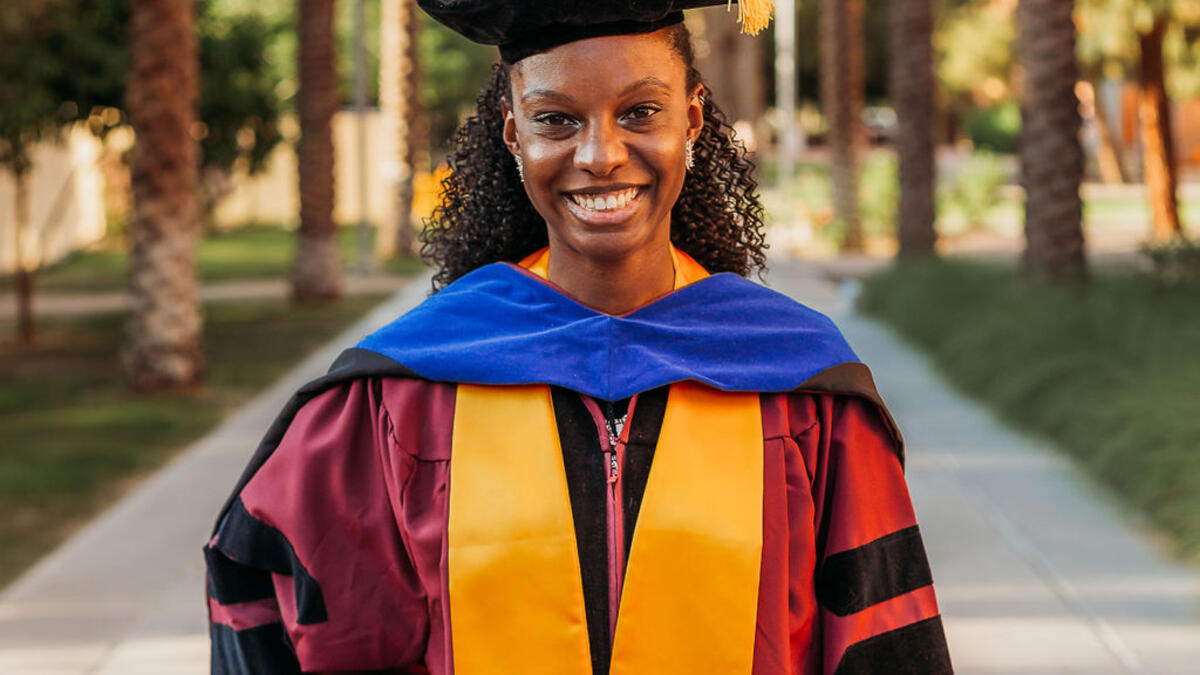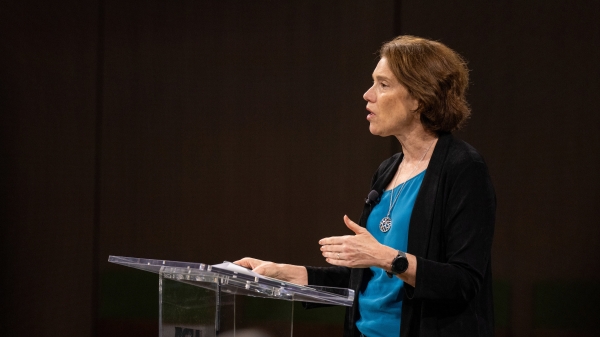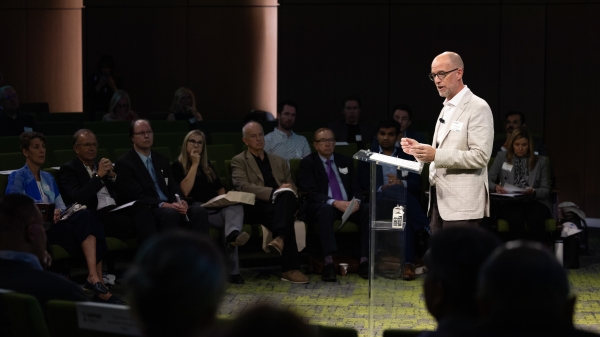Preparing for water crises and making cities more resilient to drought

Leah Jones
Editor's note: This story is part of a series of profiles of notable spring 2021 graduates.
Water is a limited resource, yet life depends on it. The western U.S. has faced severe drought for decades, and it’s only expected to get worse. More needs to be done to make cities better prepared for water crises. Leah Jones is researching ways to do just that, earning her PhD in sustainability at the School of Sustainability in the College of Global Futures.
“My main area of focus is on water governance, which is the government, policy, social systems, economics and stakeholders involved in the decision making and management of water resources,” Jones said. “Many people do not know where their water comes from. If you ask them, they’ll just say it comes from the tap. They don't have a full concept of the fact that it comes from a river or a lake. I became fascinated with that. In a lot of the spaces within sustainability, like food and energy, we can adapt to something different. But with water, there’s just water. There’s no alternative.”
Jones is especially intrigued by how cities in desert climates manage their water resources, and that's part of what drew her to Arizona State University and the School of Sustainability.
“I wanted to study water sustainability specifically, and that made ASU even more appealing. I'm so intrigued by how people live in a desert. Now living here, it makes sense. The water governance and water policies are very robust in Phoenix. They are so intricate compared to other places, even other drought cities. I think it can set an example for other places around the world.”
Phoenix was one of the subjects of Jones’ dissertation. She studied the links and interactions between food, energy and water, both here in the Phoenix metropolitan area and in Cape Town, South Africa, to understand how governance decisions and collaboration between those three sectors could make a city more resilient to drought. Jones has also researched water policies and governance in Nepal and Botswana as part of the ASU Study Abroad program.
Research hasn't been her only focus at ASU. Jones is an engaged and active leader on campus, participating in many clubs, organizations and mentorships, including the Graduate and Professional Student Association as president and director of diversity and inclusion. During her time with association, Jones has focused on improving inclusivity at ASU.
“I wanted to amplify students' voices that I felt weren't being heard, especially BIPOCBlack, Indigenous and people of color voices," Jones said "One of the things I worked on was gathering those voices and elevating them to the administration. What I did, in addition to what my predecessors did as well as people who have come after me, ultimately helped lead to the LIFT initiative put forth by President (Michael) Crow. That has been encouraging to see. You just have to keep pushing and taking little steps forward, and ultimately change can happen.”
Making those changes is something Jones wants to continue as she works toward her goal of becoming a tenured professor.
“Within higher education, mentorship is one of the most important things to me, especially being a Black woman. There are very few Black professors in the U.S., and often it's hard for undergraduate students to imagine a career in higher education, science or research because they don't see anyone who looks like them. I would love to be a mentor and encourage BIPOC students to pursue careers in research and higher education.”
The sustainability program has given Jones the resources to become a strong leader and make positive change.
“I've grown as a student and a sustainability scholar," Jones said. I’ve explored so many different, intellectual perspectives which have been eye-opening and encouraging for me and my development. The program is supportive of students; I feel like I have a community.”
Question: What was your “aha” moment when you realized you wanted to study sustainability?
Answer: In high school, I took AP environmental science and became fascinated at the intersection between science and its application to the world around it. Going into my undergraduate program, I majored in environmental science but felt like the human component was missing. That's when I started looking into sustainability. I liked studying environmental science and examining those environmental interactions, especially in our changing world. But without considering the human component, we were falling short of actually making change in our world. With sustainability, I was able to integrate the environment and human dimensions.
Q: What’s something you learned while at ASU — in the classroom or otherwise — that surprised you or changed your perspective?
A: My first semester was very eye-opening. I think when students came into sustainability, we had much more positive perspectives on how we were going to change the world and what we wanted to do with changing food systems, water systems or finding renewable energy sources. When we realized the complexity of all of these different systems, it was a bit discouraging at first. But I think it ultimately led me to understand that it's not that we can't address any of these problems, it's just that we need to address multiple problems at once, and sometimes that results in a more incremental and slower change. When we're able to consider this system thinking approach, instead of more siloed thinking in the different areas of sustainability, that can lead to long-term change.
Q: Which professor taught you the most important lesson while at ASU?
A: My adviser, Professor Dave White, has been very influential and encouraging throughout this whole process. He has helped shape me to be a successful student and a successful scholar within sustainability. I’ve learned a lot from him, including what it looks like to move beyond being a student and into becoming a professor within higher education and how to grow in that space.
Q: What’s the best piece of advice you’d give to those still in school?
A: This is not my advice, but it was really helpful for me, so I continue to pass it on. A PhD is not a sprint but a marathon; it takes time. Getting things done happens in little by little increments, but it will get done. You can't try to sprint to the finish line because you'll just burn out at the beginning.
More Environment and sustainability

Researcher works on changing people's mindsets to fight climate change
Meaningful action to heal the climate requires a complete shift in the way people think and perceive each other, according to an…

NOAA, ASU offer workshop to bridge ocean exploration, education
Oceans are vital to sustaining life on Earth, as they produce over half of the oxygen we breathe and play a crucial role in…

A united front for sustainability and the economy
When four leaders of esteemed learning institutions and the mayor of Phoenix gather in one location at the same time, it’s a tip-…